News and Announcements
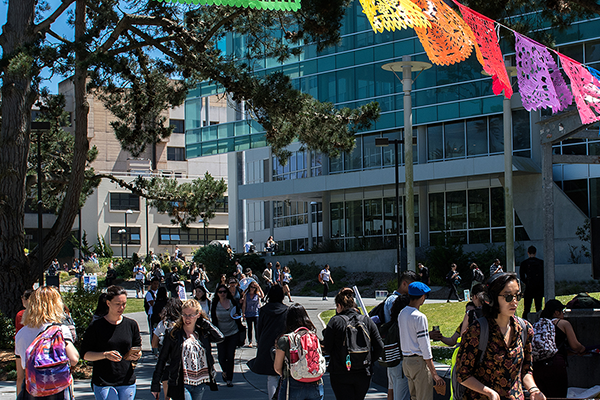
U.S. News & World Report has ranked SF State eighth in the nation for social mobility in its 2024 Best Colleges list. SF State’s overall ranking also jumped significantly over the previous year, up by 56, thanks to methodology changes that put more emphasis on social mobility and outcomes for graduates.
U.S. News & World Report changed its approach in response to criticism that some factors it previously weighted heavily, such as class size and alumni giving, tilted the scales in favor of wealthy private universities. For this year’s Best Colleges list, more than 50% of an institution’s rank is based on success in enrolling students from diverse backgrounds and graduating them with minimal debt. It also took the post-graduation success of graduates into account. As a result, several CSU campuses saw significant jumps in their rankings, including SF State.
“SF State students come from diverse economic backgrounds — more than half of our students are fully supported by grant and scholarship aid,” said Senior Associate Vice President for Enrollment Management Katie Lynch. “It makes sense that we are an engine for social mobility, but it’s more than that. It is the experience that students have at State that allows them to give back to their families, communities and more.”
On the 2024 Best Colleges list, SF State is ranked:
- #8 in Top Performers on Social Mobility (tied with Oakland City University in Oakland City, Indiana)
- #96 in Top Public Schools
- #178 in National Universities
- #49 in Best Undergraduate Engineering Programs
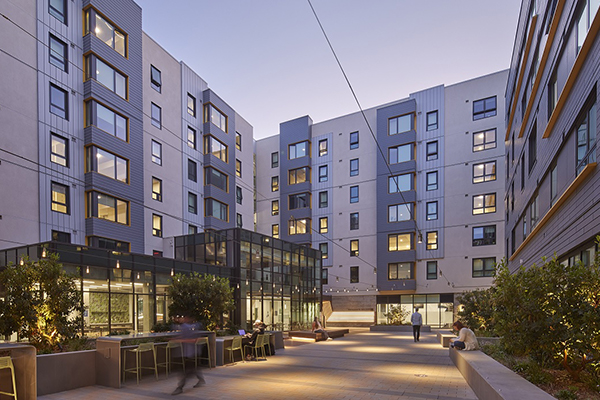
SF State has been awarded one of the highest rankings available for campus sustainability: a gold from the Sustainability Tracking, Assessment & Rating System (STARS). A program of the Association for the Advancement of Sustainability in Higher Education, STARS assesses the practices of colleges and universities across the country — only 150 of which achieved a gold rating. Of the 22 CSU campuses taking part in the STARS assessment this year, SF State was ranked third, behind only CSU, Chico and Cal Poly Humboldt.
“We have been working for a year to document our many sustainability initiatives and are very excited our score reflects SF State’s expanding sustainability program,” said Director of Sustainability & Energy Caitlin Steele.
Among the new efforts featured in SF State’s 2023 STARS assessment were Climate HQ, the University’s new communication hub for climate action, and a Climate Change Certificate program that gives students a foundational understanding of climate change’s causes, effects and solutions. Other highlights included policy changes that deepen the San Francisco State University Foundation’s commitment to socially responsible investing and efforts to ensure that new campus buildings are constructed with sustainability as a top priority. The three-year-old Manzanita Square mixed-use residential center has won another top national ranking for sustainability — a LEED Gold certification — while the Science & Engineering Innovation Center and a new West Campus Green housing unit, both currently under construction, have been designed to do so, as well. Manzanita Square is an all-electric building that supports the state of California’s decarbonization efforts. The Science & Engineering Innovation Center and the new West Campus Green housing development will also be all-electric.
Steele also points to the University’s hiring of its first climate action coordinator, Taylor Mogavero, as an indication of its commitment to sustainability. Mogavero will develop and implement campus sustainability programs, build relationships both internally and externally to support sustainability initiatives and support a campus culture that reflects sustainability, social justice and climate action values. Current projects include analyzing the University’s 2023 transportation survey and updating its transportation demand management report, analyzing greenhouse gas emissions and creating a new climate action plan.
“It’s been amazing working at SF State so far. The sustainability initiatives here are already so strong, and there is great potential to be even better,” said Mogavero, who came to work for the University in August. “Starting my experience at SF State by completing the AASHE STARS report was really enlightening. The report is so detailed and really makes you think about every aspect of the University. We received a great score, but there’s always room to improve.”
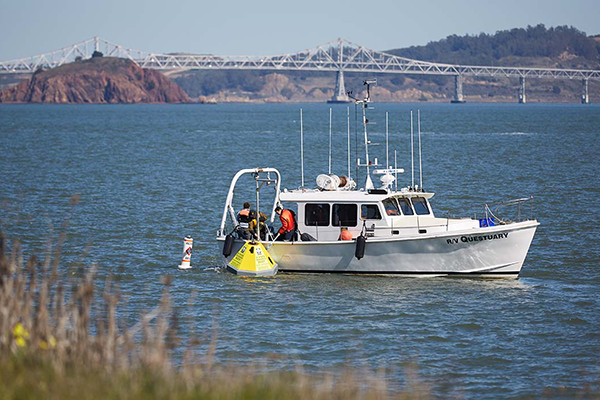
SF State’s Estuary & Ocean Science (EOS) Center has received a $4.35 million grant from the California State Coastal Conservancy (SCC) to build coastal resiliency in the San Francisco Bay. The multipronged three-year endeavor will work on nature-based adaptations to mitigate the effects of climate change, provide community partners with guidance and develop academic curricula and field trips for local youth. The proposal consists of four main projects, with several aiming to boost the number of people qualified for related jobs.
“I think this proposal represents a direction that the EOS Center and the University broadly are embracing. Understanding climate change and adapting to and mitigating climate change are really important topics for us to focus a lot of our attention on,” said EOS Center’s Interim Executive Director and lead scientist Katharyn Boyer, noting how this work intersects with other topics that “we at San Francisco State hold dear, like social justice.”
“We’re certainly interested in training scientists, but we’re also interested in the fact that there is so much work to be done now,” said Boyer, explaining that more hands-on experiences might help youth interested in entry-level jobs related to the Bay. “For coastal climate adaption, there needs to be people who know how to design and fabricate and actually implement these kinds of projects. There’s a wide range of workforce needs.”
This SCC-funded project was designed with input from a variety of community collaborators, Boyer explains. Community partners included several community colleges, government agencies, other science and environmental organizations, including co-located partners at the EOS Center, the Smithsonian Environmental Research Center and the National Estuarine Research Reserve. The projects are:
- Climate workforce capacity building: In collaboration with seven community colleges, the EOS Center and partners will develop new curricula, provide real-world data sets and organize field trips to nature-based shoreline projects for hands-on work with implementation and monitoring. Scientists will also organize field trips and offer training relevant to nature-based shoreline projects for English-language learners from San Rafael's Canal community (via a collaboration with Conservation Corps North Bay) and underserved communities in San Francisco's Bayview/Hunters Point (via a collaboration with Literacy for Environmental Justice). Teachers and staff at collaborating institutions will also have educational opportunities and support. The intent is to build an educational pipeline to four-year institutions like SF State.
- Oyster shell recycling pilot: Scientists are testing human-made oyster reefs to protect against shoreline erosion, and incorporating native oyster shells may help make these structures a desirable habitat for native species. Since there is no robust source of local shells, scientists will work with two major restaurants to collect and prepare the shells. Information about the project and its environmental importance will be shared with more than 250,000 restaurant patrons per year. Vocational training will be offered for the Canal community youth in San Rafael through a collaboration with the Conservation Corps North Bay.
- Planning and permitting a living seawall at the EOS Center, Tiburon: A living seawall incorporates materials conducive for native species along traditional vertical seawalls, which typically have little habitat value. The seawall at the EOS Center will be retrofitted to include horizontal relief in a variety of configurations, which will allow scientists and students to determine best approaches to create habitat and shoreline resilience. This funding supports the first step: design and permitting of the seawall retrofit, which will also include a small boat launching facility to make the seawall more accessible for research and community visits.
-
Pilot Regional Climate Science Consortium: The EOS Center will dedicate offices/meeting spaces for groups of scientists focused on advancing innovative science guidance for nature-based adaptations along shorelines in the San Francisco Bay. This consortium will work with partners to identify scientific needs, summarize findings and advice, and provide guidance on environmental and shoreline projects.
In addition to supporting collaborations with community colleges and other local organizations focused on underserved youth, the new grant also has funds to support work with Indigenous communities. By providing youth with projects that educate them on the effects of climate change, Boyer hopes they can make informed decisions about their career paths and their communities.
“We want youth in these underserved communities to have some tools and some agency about what happens along their shorelines,” Boyer added. “And we want to know from these communities from the very beginning how they think this work should look.”
At SF State, the program also provides University students a chance to participate in field trips and be scientific colleagues. For instance, Boyer hopes SF State graduate student participation might encourage a near-peer mentorship relationship between SF State students and youth from collaborating organizations.
“This is a major push for the EOS Center to expand our capacity to do climate adaptation work and to involve our students and to involve the region’s youth,” said Boyer. “Climate change is one of the biggest issues of our time and it’s exciting that scientists at SF State are leading in innovation and creation of educational opportunity to work with nature to lessen the impacts.”
Professor of Social Work Yeon-Shim Lee and her colleagues were recently awarded a research grant from the Alzheimer’s Association to study psychosocial and cultural factors that affect Alzheimer’s Disease and Related Dementia (ADRD) screening and develop health intervention among Indigenous populations in the Northern Plains.
Building upon their previous findings that Indigenous populations have high levels of health/mental health problems yet underutilize health/mental health services, the proposed study conceptualizes low ADRD literacy as a major reason for service underutilization and a central focus of intervention efforts. The overall goals are to increase understanding of the levels of knowledge on ADRD manifested in the target population and to lay the groundwork for the development of a culturally tailored health intervention. Future work must improve culturally grounded understanding and awareness of declining cognitive ability among older Indigenous people.
The SF State Safe Zone Ally program seeks staff, faculty and administrators to become safe zone allies for the campus’ LGBTQ+ community. The program’s mission is to foster a welcoming, inclusive and equitable campus environment by building a support network for people of all gender and sexual identities. Safe Zone allies are active and visible volunteers who are open to talking to members of the LGBTQ+ community in a confidential and supportive environment.
To become a Safe Zone ally, volunteers must complete a Safe Zone Ally training. Several trainings are offered throughout the year. The next training will be held virtually in two parts: Friday, Nov. 3, 1 – 4 p.m., and Friday, Nov. 10, 1 – 4 p.m. (participants must attend both).
Preregistration is required. For details and to register, please email Rick Nizzardini.
What better way to celebrate 20 years of cybersecurity awareness than to learn about multi-factor authentication (MFA). MFA is a security measure that requires anyone logging into an account to navigate a two-step process to prove their identity. It makes it twice as hard for criminals to access an online account.
When it’s available, always turn it on because it’s easy to do and increases your security. Why go through all this trouble? Because multi-factor authentication makes it extremely hard for hackers to access your online accounts, even if they know your password.
Visit the Information Technology Services website for more information.
Meili Hau, director of the Student Health Center at SF State, has a message for students: Health is wealth! The goal of the Student Health Center is to keep all students healthy.
Students may schedule an appointment online through MyHealth, call (415) 338-1251 or visit in person.
Visit the Student Health Center website for a full list of services.
The SF State Academic Senate met on Tuesday, Sept. 26, at Seven Hills Conference Center and via Zoom.
A summary of the meeting:
- The senate passed:
- Resolution on Faculty Trustee Attendance Academic Senate Meetings.
- New Minor in Disability Studies.
- The senate heard in first reading:
- Resolution in Support of Deepening and Re-Imagining the Senior Capstone.
- Distance Education Authorization for M.A. in International Relations.
View the full agenda, meeting materials and minutes on the Academic Senate website.
‘From SNCC to Reparations: Lessons in Solidarity and Student Activism’ with Omali Yeshitela | Oct. 3
Omali Yeshitela, author of “The Verdict Is In: Reparations Now!” and chair of the African People’s Socialist Party, will present a lecture on Tuesday, Oct. 3, 2 – 3 p.m. in Knuth Hall, Creative Arts building. His lecture is titled “From SNCC to Reparations: Lessons in Solidarity and Student Activism.”
The event is sponsored by the 1968 – 1969 Black Student Union/Third World Liberation Strike Commemoration Committee of the College of Ethnic Studies. Co-sponsors are the Richard Oakes Multicultural Center, Student Affairs and Enrollment Management, and the George and Judy Marcus Endowed Chair in Social Justice Filmmaking.
For more information, please contact Tiffany Caesar.
Staff Council will host a Fall Fest for all staff members on campus. Please join them on the fifth-floor patio of the Administration building on Wednesday, Oct. 4, 9 – 10:30 a.m. Say hello and take a break!
For questions, please email the Staff Council.
The University Police Department is excited to host the Coffee with a Cop event on Wednesday, Oct. 4, 9 a.m. – 1 p.m. on the plaza level of the Cesar Chavez Student Center. It provides an opportunity for the campus community to ask questions and share ideas over a free cup of coffee.
On Wednesday, Oct. 4, the College of Professional & Global Education will hold three online information sessions for the fully online degree completion programs:
- B.A. in Criminal Justice Studies
- B.S. in Business Administration
- B.A. in Psychology
Individuals who have completed 60 college units may be eligible.
The Graduation Writing Assessment Requirement (GWAR) learning community is a discussion-based support course for current and future GWAR instructors. Led by the Center for Equity and Excellence in Teaching and Learning (CEETL), the community shares strategies for workload management, student engagement, grading, peer review and best practices in the teaching of reading and writing.
The learning community will meet over the course of three synchronous Zoom meetings on Oct. 6, Oct. 20 and Nov. 3 — all Fridays 10 a.m. – noon via Zoom. Asynchronous activities will also take place. The total time commitment is 10 hours.
Participants who successfully complete the learning community will be eligible for $500 stipends. Participants from last year’s GWAR learning community who could not complete the course are particularly encouraged to apply. Women and Gender Studies Professor Kasturi Ray will serve as facilitator.
For more information and to sign up by Tuesday, Oct. 3, please visit the CEETL website.
On Thursday, Oct. 12, 8 – 10:30 a.m. at the Westin St. Francis, SF State President Lynn Mahoney will speak at an event hosted by the San Francisco Business Times focused on the future of the city.
Titled “San Francisco Structures,” the event will bring together local leaders, including Mayor London Breed, to answer important questions that will help shape San Francisco’s recovery. Specifically, President Mahoney will provide her perspective on the important role universities like SF State play in the city’s future.
Purchase your tickets by Friday, Oct. 6, on the San Francisco Business Times website.
The Raza Faculty and Staff Association at SF State is holding a fundraiser in celebration of Latinx Heritage Month at El Rio SF. The fundraiser aims to grow funds for Latinx enrichment initiatives at SF State.
El Rio will donate 30% of the proceeds collected on Friday, Oct. 13, 4 – 6 p.m. Everyone over 21 is welcome! (You do not need to be a dues-paying member to attend.) Bring a colleague or a friend and be in community with other Latinx faculty and staff on campus!
Registration is not required, but is greatly appreciated. For questions, contact Elizabeth Gandara.
For more information or to register, visit the Raza Faculty and Staff Association website.
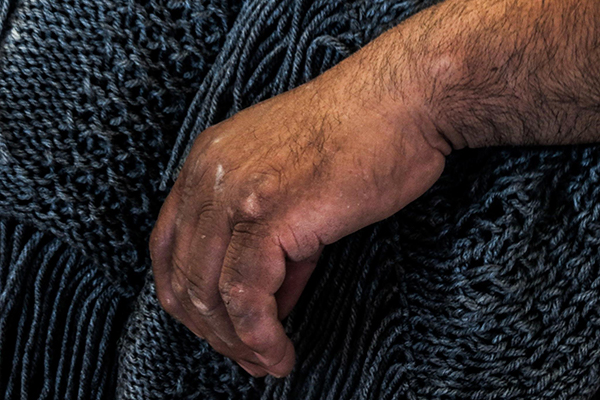
Join the Museum Studies Program and the Global Museum for their exhibit opening reception on Saturday, Oct. 14, 1 – 3 p.m. in the Global Museum (Fine Arts 203). Admission is free.
“En los campos del norte / In the Fields of the North” explores the lives of contemporary seasonal and migrant farm workers on the West Coast through community stories, interactives, objects and a series of black-and-white evocative photographs by artist David Bacon. The exhibit is open Tuesday, Oct. 3, – Thursday, Dec. 7, Tuesdays – Thursdays, 11 a.m. – 4 p.m.
Follow the Global Museum and Museum Studies Program on Facebook for updates.
Photo by Angelica Anguiano Alcaraz
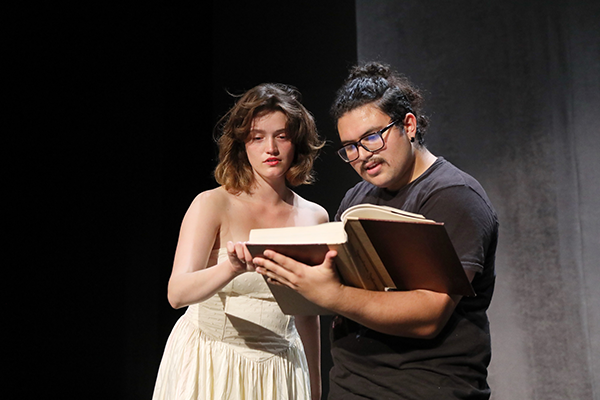
A unique and timely meditation on grief, “Eurydice,” by Sarah Ruhl, will be presented Thursday, Oct. 19 – Thursday, Oct. 29, in the Little Theatre, Creative Arts Building.
Ruhl has been called a "playwright laureate of grief,” and “Eurydice” is her exploration of her grief after the loss of her father, who died of cancer when she was 20. In Ruhl’s retelling of the Orpheus/Eurydice myth, the dead Eurydice reconnects with her dead father, and they revel in their chance to restore their love. With this evocative work, Ruhl asks us to contemplate the power of loss and the purpose of grief.
For director and Theatre Arts Professor Bruce Avery, the tumultuous events and public health crises of the past few years have left a clear imprint on our collective emotional consciousness. Each student, parent, instructor and community member has experienced the effects of grief and loss during this time, many ongoing and still unresolved.
“Grief is about loss, but it's also about what didn't happen because of that loss,” Avery said. “The conversations, the moments, the laughs that we wish we had shared with those who are gone.”
Tickets are $15 for general admission and $9 for students. Visit the School of Theatre and Dance website for all showtimes and to purchase tickets.
The Ninth Annual Women’s Emerging Leadership Forum, hosted by the Lam Family College of Business, will be held Friday, Nov. 3, 8:45 am. – 2:45 p.m. at KPMG LLP, 55 Second Street, 11th floor, San Francisco. This year’s theme is “Embracing Change and Alchemizing the Future.”
The event features inspiring, dynamic speakers who will share their one-of-a-kind stories, having lived through, managed, envisioned and materialized various forms of change in their professional and personal lives.
Speakers
- Rebecca Tierney, co-founder and CEO, AdaMarie
- Sally Thornton, CEO and founder, Forshay
- Thuy Vu, co-founder and CEO, Global Mentor Network
- Chia-Lin Simmons, CEO, LogicMark Inc.
- Jessica Appelgren, marcomms lead, X, The Moonshot Co. (formerly Google X)
- Heather Watkins, co-founder and COO, Bold Reuse
A special two-for-one ticket offer is available. This event sells out every year, so buy your tickets now to reserve your seat.
Learn more about the event schedule and speakers on the Lam Family College of Business website.
University President Lynn Mahoney and her cabinet will host the 2023 End of Year Celebration for faculty and staff on Thursday, Dec. 14, 3 – 5 p.m.
Location and other details will follow later in the semester.
SF State Spotlight
If you’re looking for a book to read during National Hispanic Heritage Month (Sept. 15 – Oct. 15) that will transport you to different worlds within the Latinx community, then look no further than SF State’s faculty and alumni. The University’s Department of Creative Writing is home to award-winning professors and graduates who have written acclaimed works of prose and poetry.
Poet Leticia Hernández-Linares (MFA, ’20) is both: A graduate of San Francisco State’s MFA program in Creative Writing, she’s now an assistant professor of Latina/Latino Studies at the University. Coming to SF State was a homecoming of sorts, she says, because of the University’s legacy of social justice activism and its talented community of artists.
“I’m excited to be a part of a long list of incredible writers in the Bay Area, poet laureates and other writers who have also gone through the program here,” she said.
A spoken word and performance artist, Hernández-Linares first created “Mucha Muchacha, Too Much Girl: Poems” (Northwestern University Press) as a spoken-word CD.
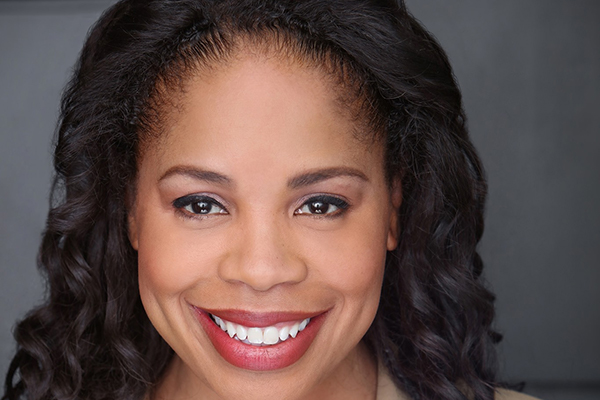
Jamillah Moore, vice president for Student Affairs and Enrollment Management, is honored as one of the Most Influential Women in Bay Area Business by the San Francisco Business Times.
The annual awards celebration, held Oct. 3 at the Hilton San Francisco, showcases the leadership, community service and mentorship that women have to change the world. Recent award winners from SF State include Provost Amy Sueyoshi in 2022 and President Lynn Mahoney in 2020.
Marc Stein, the Jamie and Phyllis Pasker Professor of History, is one of seven faculty members and leaders nationwide to discuss tenure density in a summer 2023 story in Liberal Education.
“The protection of tenure has never been more important than now for LGBTQ+ faculty and those whose scholarship focuses on LGBTQ+ topics,” Stein said. “In states across the country, faculty who research and teach LGBTQ+ issues are highly vulnerable and under attack. The threat extends beyond the immediate moment. My work shows that it was virtually impossible to do LGBTQ+ research in higher education before the 1970s.”
Liberal Education is a publication of the American Association of Colleges and Universities.
Social Work Lecturer Ricka White Soso was a panelist at the 28th San Diego International Summit on Violence, Abuse and Trauma Across the Lifespan, held Aug. 27 – 30. The session was titled “Racial Trauma and Culture Healing (Addressing Lateral Violence).”
The abstract explained: “Lateral violence occurs when members of an oppressed community into have ‘internalized the oppressor’ and engage in acts of oppression within their communities even though the true adversaries are historical and ongoing colonialism, internalized racism, and oppression in other forms.” The presentation explores the ways lateral violence can be present in communities and shares strategies to counter lateral violence and support community healing.
Nutrition and Dietetics Associate Professor Zubaida Qamar recently completed a Climate Farm School course at Green Valley Farm and Mill in Sonoma County.
The one-month course includes online training and on-farm experience focused on regenerative agriculture and climate impacts on food systems. The course is aimed at mid-career professionals who are passionate about food and climate. The San Francisco Chronicle covered the course on Sept. 9.
Recreation, Parks, Tourism and Holistic Health Professors Richard Harvey and Erik Peper presented the invited 90-minute virtual symposium, “Innovative Strategies for WRMSD Prevention,” at the 11th PREMUS, WDPI & MYOPAIN 2023 International Scientific Conference on Sept. 24, in Bengaluru, India.
College of Ethnic Studies Dean Grace Yoo is quoted in a San Francisco Examiner preview of Chuseok, the Korean harvest moon festival in the city.
“My favorite part is the food and the vendors that are present, including the Asian American Curriculum Project,” she said in the Sept. 26 article. “I am planning to attend with all my San Francisco Bay Area cousins. It’s a great time for friends and family to reconnect.”
As the San Francisco mayoral election is just over a year away, Political Science Associate Professor Jason McDaniel discusses the candidacy of philanthropist Daniel Lurie in a Sept. 27 story in the San Francisco Chronicle.
“[Incumbent Mayor] London Breed is vulnerable,” McDaniel said. “But he can’t run on just being ‘Not London Breed.’”